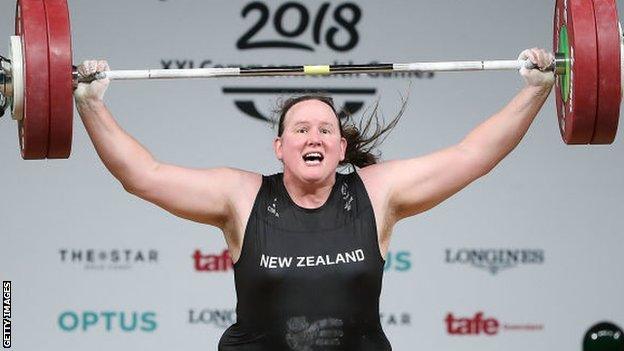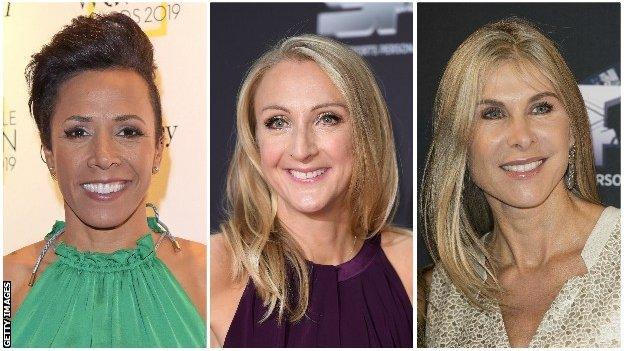Sharron Davies fears for female athletes at Tokyo Olympic Games
- Published

Laurel Hubbard was injured in the 2018 Commonwealth Games but is hoping to qualify for the Tokyo 2020 Olympics
It will take female athletes "being thrown under the bus" at Tokyo 2020 before changes are made to transgender rules, says ex-swimmer Sharron Davies.
International Olympic Committee (IOC) guidelines state that transgender women must suppress testosterone levels for at least 12 months before competition.
But in March, Davies and others wrote to the IOC calling for more research.
In Tokyo, Laurel Hubbard of New Zealand could become the first transgender female to win an Olympic medal.
The 41-year-old weightlifter won two golds at the Pacific Games earlier in July.
After Samoa's Commonwealth Games champion Feagaiga Stowers missed out on a medal, Hubbard's participation was criticised. , external
An Olympic silver medallist in 1980, Davies - who said she has had no response from the IOC since writing to it - says the body is conducting a "live experiment".
The Briton told BBC Sport: "I find it extraordinary that [Hubbard winning medals] is where we have to go before the IOC open their eyes.
"I'm positive things will change but the problem is we will be throwing females under the bus before it does change."
Transgender women in sport is a hotly debated topic, with former Wimbledon champion Martina Navratilova and transgender cyclist Rachel McKinnon among those who have entered the discussion.
Davies believes that reducing testosterone for 12 months before competition does not represent a level playing field for female athletes.
She says that despite those guidelines, transgender female athletes retain biological advantages gained in puberty.
However, some transgender women, such as masters track cycling world champion McKinnon, say reducing testosterone in their bodies results in "radical physiological changes".
The IOC did not respond to BBC Sport's request on whether it would change its guidelines for the Tokyo Olympics, but said it was "working to develop new guidance" to help international federations (IFs) shape sport-specific policies and regulations in relation to fairness, safety, inclusivity and non-discrimination."
It added it was "committed to furthering inclusion, without discrimination based on gender identity and/or sex characteristics" and "is also concerned to ensure equality for women and their empowerment across sport".

Dame Kelly Holmes, Paula Radcliffe and Sharon Davies all want more discussion on transgender athletes
'The IOC is not interested in what athletes have to say'
Davies, two-time Olympic champion Dame Kelly Holmes and marathon world record holder Paula Radcliffe - with the support of 60 other top-class athletes - wrote a letter to IOC president Thomas Bach in March asking for the body to look further into the "residual benefits" of being a transgender athlete.
But the lack of response means she does not expect anything to change before the Tokyo Games, which start on 24 July 2020.
"We've had nothing, not even a polite letter to say thank you for your interest or your request and we will look into it," she added.
"It just says that the IOC is not interested in what athletes have to say. I find this so disheartening when sport should be run for the athletes.
"I think it will take some situations at the Olympics and people being very distressed with what they see before we see any changes.
"Once we start seeing well-known female athletes being beaten, then people will start standing up and understanding the situation. It will be a shame because it should be about the sport, fairness and the best we can be."
The IOC has told BBC Sport however that they have not received any letter from Davies, Holmes and Radcliffe.
The IOC said: "Our approach to providing guidance on participation is based on an ever-evolving area of research and learning" by consulting medical, scientific, legal and human rights experts, the IOC athletes' commission, the IOC women and sport commission, IFs, and national governing bodies.
It added: "Our guidance will be subject to periodic review in order to take account of relevant developments in the area, in consultation with all stakeholders concerned."